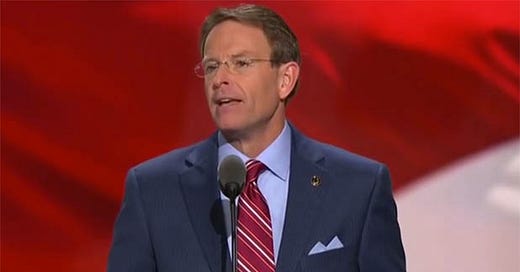
The Family Research Council champions marriage and family as the foundation of civilization, the seedbed of virtue, and the wellspring of society.
It's the first sentence you'll find in the "Marriage and Family" section of the website belonging to the Family Research Council, a prominent conservative Christian organization founded by James Dobson, and now led by Tony Perkins.
Sure enough, the FRC has long been a vocal advocate for the sanctity of marriage and traditional family values. Perkins has preached exhaustively about the topic, even saying in an address just two years ago that President Obama's support of same-sex marriage (and by extension same-sex parenting) had led to "havoc in our homes and blood on our streets."
Thus, many have found it puzzling that Perkins and the FRC (along with several other evangelical leaders and organizations) have become unwavering supporters of our current president, Donald Trump. Perkins even went as far as to officially endorse Trump's candidacy at the Republican National Convention in 2016.
Why has this been confusing? For starters, it just so happens that Trump — like Obama (and the vast majority of the country) — also supports same-sex marriage.
I guess the "havoc in our homes" and "blood on our streets" stuff sounds worse than it really is.
But it's much more than that, including the broader theme of the sanctity of marriage.
Donald Trump (who's been married three times) engaged in a very public affair while married to his first wife. On a number of occasions, he has openly bragged about pursuing and having other affairs with married women. And according to recent reporting by the Wall Street Journal, Trump even cheated on his current wife (our First Lady), Melania, with porn-star named Stormy Daniels, back in 2006.
The sexual encounter allegedly took place just four months after the birth of Trump's youngest son, as detailed in a recently unearthed interview with Daniels from 2011. The relationship was so potentially damaging to our president's political aspirations that Trump's lawyer, Michael Cohen, set up a limited liability company from which to pay Daniels $130,000 (just days before the election) to keep silent on the matter.
Still, Perkins and other highly influential evangelical figures (along with a strong majority of evangelical voters) have unequivocally had Trump's back, and continue to.
As a Christian myself, this kind of thing continues to puzzle me. While I always understood and respected the "lesser of two evils" argument when it came to voting in the 2016 election, I've had a much harder time wrapping my mind around the seemingly unconditional devotion that Trump — a man well-known for his moral indecency — has enjoyed from so many of my fellow Christians. I know I'm not alone in that confusion.
Fortunately, Politico's Edward-Isaac Dovere called upon Perkins to fill in the blanks in a podcast interview that was posted on Tuesday. And boy, was it enlightening.
"We kind of gave him—All right, you get a mulligan. You get a do-over here," explained Perkins, describing how evangelicals have essentially given President Trump a pass on the first 70 or so years of his life.
Wow. How nice of them. End of story, I guess.
But seriously, did Trump somehow manage to convince Perkins and the rest of the evangelical community that he has turned over a new leaf, and that he has abandoned his past moral shortcomings and accepted Christ as his savior? Forgiveness, after all, is indeed a tenet of the Christian faith.
The answer, according to Perkins, seems to be no. In fact, Perkins was surprisingly upfront about how his endorsement was purely a political calculation. It was predicated on verbal assurances that Trump would appoint pro-life judges (presumably referring to Supreme Court nominees), not change the Republican platform on social issues, and pick a pro-life running mate.
Talk about a cheap date.
It was quite the bargain for Trump, who gained evangelical cover not only for his chronic dishonesty and vindictive nature, but for such debacles as mocking a disabled reporter, publicly musing over a journalist's menstrual cycle, framing illegal immigrants as rapists, and later, the infamous Access Hollywood tape.
Has Trump done anything to "disappoint" Perkins since taking office? Perkins claims he hasn't, and went on to describe our president as a "pretty decent human being."
Okay then.
When Dovere asked Perkins how he has explained Trump's behavior to his children, Perkins rationalized Trump's "barbed attacks" by saying that Trump often doesn't like what is said about him by others, and by lashing out, he's simply fulfilling a need for acceptance. Perkins used the same argument to gloss over Trump's insistence that John McCain wasn't a war hero.
Not exactly the "turn the other cheek" philosophy one might have expected a Christian leader to promote.
Dovere eventually got around to the porn-star controversy, and asked why it hasn't diminished the president's standing with evangelicals. Unlike Franklin Graham, who has chosen (despite the evidence) to disbelieve the story, Perkins has accepted the incident as fact.
"Evangelicals did not vote for Donald Trump based on his moral qualifications," he explained. "but what he said he was going to do, and who he was surrounding himself with."
Presumably, by 'who he was surrounding himself with,' Perkins was referring to Trump's cabinet picks and not Stormy Daniels. And in one of the more ballsy examples of whataboutism I've heard in some time, Perkins added that Hillary Clinton didn't have a "pristine background" either.
Brilliant.
Rest assured, however, that Perkins didn't let Trump completely off the hook for his x-rated extramarital escapades. In fact, he offered this caveat: "If the president were to all of sudden revert back to some of that behavior, as president, the evangelical support will not be there for him."
I don't know about you, but it's quite comforting for me to hear that no pornographic-adultery mulligans will be issued from here on out. By the way, is it possible to get that in writing?
So what exactly is the evangelical case for supporting President Trump? Perkins stated it numerous times throughout the interview: Policy, plain and simple.
In addition to getting his way on a conservative Supreme Court justice (Neil Gorsuch) and an unquestionably pro-life Vice President, Perkins is very pleased with Trump's executive orders on "religious freedom" issues, such as the rolling back of Obamacare's birth control mandate. He also appreciates the president's public statements in support of the pro-life movement.
Perkins pointed out more than once that he and the evangelical community wouldn't have gotten any of these things if Hillary Clinton had won, and he's assuredly right about that.
What was not explained was why Trump received so much early evangelical support, dating as far back as the first few months of the GOP primary. After all, Trump was the least socially conservative of any of the 17 candidates than ran for the nomination, having previously described himself as "very pro-choice" and a supporter of Planned Parenthood. Even during the campaign, Trump (who couldn't come up with a single Bible verse when asked) repeatedly mocked Ben Carson for sharing stories of his faith journey.
It should be noted that, unlike Jerry Falwell Jr., Perkins was not an early Trump adapter. He endorsed Ted Cruz in the primary.
The other question was why the evangelical leaders who've endorsed Trump refuse to speak out when he says or does things that stand at direct odds with their faith. For example, I'm pretty sure that there was a time (probably not all that long ago) when Christian leaders would have looked down on someone for endorsing the campaign of a credibly accused child molester running for the U.S. Senate. The same goes for opposing immigration from "shithole" countries.
Perkins offered a hint in this area, describing Trump as a "transactional" president who grants things to those who are "loyal" to him. Loyalty — that might explain why Perkins was so adamant that Trump hasn't done anything, since taking office, that has disappointed him. Not one thing.
When pressed on his apathy, Perkins kept reverting back to the notion that Trump was a better selection than Hillary. It's the same thing that many Trump fans have been saying for the past year, and their point is certainly understood. But while the "binary choice" argument between Trump and Clinton may have been compelling back in 2016, what relevance does it have now? Does a handful of political and rhetorical wins for social conservatives really have to come at the cost of remaining utterly silent on important issues of character, culture, and morality?
Maybe with this president, it does.
Now, I'm not suggesting that religious leaders become more politically active than they already are. But when they shrug their shoulders at indecency from the people they endorse, after years of insisting that President Obama's conduct disqualified him from even being a Christian (as Perkins absolutely did), it leaves the impression that these folks are nothing more than partisan political pawns who don't actually practice what they preach.
I mean, does anyone really believe that if it had come out in 2010 that President Obama had cheated on Michelle with a porn-star, the religious right (including people like Perkins, Graham, and Falwell) wouldn't have thrown a public conniption fit until Obama's last day in office?
Are Christians really comfortable with such glaring hypocrisy from prominent religious leaders who profess to share their beliefs? Maybe most are, as long as they feel as though they're getting something out of it. I really don't know.
What I do know is that as much as I've written over the past couple of years on the increasing willingness of people to compromise their long-held principles for short-term political gain, I haven't been able to put forth a more compelling illustration of it than Perkins just did.












